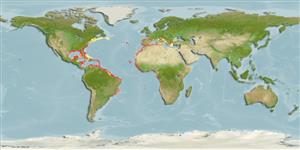>
Carangiformes (Jacks) >
Carangidae (Jacks and pompanos) > Caranginae
Etymology: Caranx: French, carangue, the name of a Caribbean fish; 1836 (Ref. 45335).
More on author: Mitchill.
Environment: milieu / climate zone / depth range / distribution range
Sinh thái học
Biển; Thuộc về nước lợ Cùng sống ở rạn san hô; Mức độ sâu 0 - 100 m (Ref. 4233). Subtropical; 46°N - 26°S, 97°W - 32°E
Eastern Atlantic: Senegal to Angola (Ref. 4225, 13121, 57392), including the western Mediterranean, St. Paul's Rocks (Ref. 13121), and Ascension Island. Reported from Mauritania (Ref. 55783). Western Atlantic: Nova Scotia, Canada to Brazil (Ref. 7251), including the Gulf of Mexico (Ref. 9626) and the Caribbean. Also found in Argentina (Ref. 59355). In the tropical Eastern Pacific, it is replaced by Caranx caballus Günther 1869, which may be conspecific.
Length at first maturity / Bộ gần gũi / Khối lượng (Trọng lượng) / Age
Maturity: Lm 27.4 range ? - ? cm
Max length : 70.0 cm TL con đực/không giới tính; (Ref. 5217); common length : 40.0 cm TL con đực/không giới tính; (Ref. 5217); Khối lượng cực đại được công bố: 5.1 kg (Ref. 40637); Tuổi cực đại được báo cáo: 11 các năm (Ref. 5803)
Các tia vây lưng cứng (tổng cộng) : 9; Các vây lưng mềm (tổng cộng) : 22 - 25; Tia cứng vây hậu môn: 3; Tia mềm vây hậu môn: 19 - 21. Diagnosis: body elongate (depth comprised 3.2-3.5 times in fork length) and moderately compressed; snout slightly rounded (Ref. 57392). Maxilla ends below middle of eye (Ref. 26938, 57391). 2 dorsal fins, 1st with 8 spines, 2nd with 1 spine and 22-25 soft rays; anal fin with 2 spines, followed by 1 spine and 19-21 soft rays (Ref. 57391, 81654). Anterior lobe of soft dorsal and anal fins moderately developed, their height smaller than head length; pectoral fins falcate, longer than head; scales small and cycloid (Ref. 57391). Chest fully scaled (erroneously reported as chest naked in other sources)(Ref. 81654). 45 (Ref. 26938, 81654) - 56 (Ref. 57392, 81654) scutes along posterior/straight part of lateral line.
Coloration: back light olivaceous to bluish-green, sides silvery-grey to golden; juveniles with about 7 dark crossbars on sides (Ref. 57392).
A schooling species (Ref. 5217, 57391) generally not far from the coast (Ref. 5217), in coastal marine and brackish waters to at least 100 m depth (Ref. 57392). Juveniles often found in association with floating Sargassum (Ref. 5217), often entering lagoons and estuaries (Ref. 57392). Adults feed on fishes, shrimps, and other invertebrates. They spawn offshore from January through August (Ref. 26938). Eggs are pelagic (Ref. 4233). Excellent food fish (Ref. 9626); marketed fresh, frozen (Ref. 5521), and salted. Often used for bait (Ref. 26938). Maximum reported total length 550mm in Ref. 57392.
Smith-Vaniz, W.F., J.-C. Quéro and M. Desoutter, 1990. Carangidae. p. 729-755. In J.C. Quero, J.C. Hureau, C. Karrer, A. Post and L. Saldanha (eds.) Check-list of the fishes of the eastern tropical Atlantic (CLOFETA). JNICT, Lisbon; SEI, Paris; and UNESCO, Paris. Vol. 2. (Ref. 7097)
IUCN Red List Status (Ref. 130435: Version 2024-1)
Threat to humans
Reports of ciguatera poisoning (Ref. 30911)
Human uses
Các nghề cá: buôn bán nhỏ; cá để chơi: đúng
Các công cụ
Special reports
Download XML
Các nguồn internet
Estimates based on models
Preferred temperature (Ref.
123201): 16.9 - 27.9, mean 24.9 °C (based on 752 cells).
Phylogenetic diversity index (Ref.
82804): PD
50 = 0.5000 [Uniqueness, from 0.5 = low to 2.0 = high].
Bayesian length-weight: a=0.01660 (0.01414 - 0.01948), b=2.96 (2.93 - 2.99), in cm total length, based on LWR estimates for this species (Ref.
93245).
Mức dinh dưỡng (Ref.
69278): 4.1 ±0.4 se; based on diet studies.
Thích nghi nhanh (Ref.
120179): Trung bình, thời gian nhân đôi của chủng quần tối thiểu là 1.4 - 4.4 năm (K=0.36; tmax=11; Fec=41,000).
Prior r = 0.78, 95% CL = 0.52 - 1.17, Based on 4 data-limited stock assessments.
Fishing Vulnerability (Ref.
59153): Low to moderate vulnerability (34 of 100).
Climate Vulnerability (Ref.
125649): Moderate to high vulnerability (53 of 100).
Nutrients (Ref.
124155): Calcium = 14.7 [5.9, 29.6] mg/100g; Iron = 0.343 [0.176, 0.734] mg/100g; Protein = 21 [19, 24] %; Omega3 = 0.222 [0.119, 0.400] g/100g; Selenium = 21.6 [8.9, 50.0] μg/100g; VitaminA = 27 [8, 94] μg/100g; Zinc = 0.396 [0.246, 0.632] mg/100g (wet weight);
